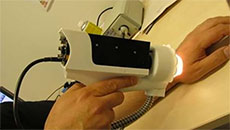Two astronomers from the Harvard-Smithsonian Center for Astrophysics are developing a new laser-based technology that may be used to find Earth-like exoplanets orbiting distant stars in the near future.
To begin with, they plan to use a powerful new optical device, installed on the Italian National Telescope, that will measure Venus' precise gravitational pull on the Sun. If they succeed, their first-of-its-kind demonstration of this new technology will be used.
"We are building a telescope that will let us see the Sun the way we would see other stars," said David Phillips, staff scientist at the Harvard-Smithsonian Center for Astrophysics.
Astronomers have identified more than 1,700 exoplanets, some as far as hundreds of light years away. Most were discovered by the traditional transit method, which measures the decrease in brightness when a planet orbiting a distant star transits that luminous body, moving directly between the Earth and the star. This provides information about the planet's size, but not its mass.
Phillips and colleague Chih-Hao Li are developing the technology called the "green astro-comb" for use with the radial velocity method that offers information about the mass of distant planets.
The radial velocity method works by measuring how exoplanet gravity changes the light emitted from its star.
From this information, astronomers will be able to determine whether distant exoplanets they discover are rocky worlds like the Earth or less dense gas giants like Jupiter.
The method is precise enough to help astronomers identify Earth-like planets in the "habitable zone" or the "sweet-spot" where water exists as liquid.
"Building the 'green astro-comb' was a challenge since we needed to convert red laser light to green frequencies. We did it by making small fibres that convert one colour of light to another," Phillips added.
The researchers plan to test the "green astro-comb" by pointing it at the Sun, analysing its spectrum to see if they can find Venus and re-discover its characteristic period of revolution, its size, its mass and its composition.
The Harvard-Smithsonian team is installing this device on the High-Accuracy Radial Velocity Planet Searcher-North (HARPS-N), a new spectrograph designed to search for exoplanets using the Italian National Telescope.
The duo is scheduled to describe the device in a paper at the Optical Society's (OSA) 98th annual meeting in Tucson, Arizona, Oct 19-23.




